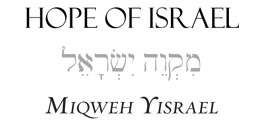Praying the Names of God - November 12
From Praying the Names of God Week Twenty-Two, Day Three

The Name
Hope is the great stabilizer. It steadies us in times of fear and difficulty, not because we know that everything will turn out as we want, but because we know that God is trustworthy. Hope is what helps us stay on course regardless of circumstances. Biblical hope finds its roots in God and in his goodness, mercy, and power. We exercise our hope when we endure patiently. We nurture our hope when we read God's Word. Though we hope for earthly blessings, our greatest hope is aimed at the life to come, when God will not only wipe away our tears but invite us to share his joy forever. When you pray to Miqweh Yisrael, the Hope of Israel, you are praying to the One who saves all those who trust in him.
Key Scripture
A blessing on the man who puts his trust in the LORD, with the LORD for his hope. He is like a tree by the waterside that thrusts its roots to the stream; when the heat comes it feels no alarm, its foliage stays green; it has no worries in a year of drought, and never ceases to bear fruit... Hope of Israel, LORD! (Jeremiah 17:7-8, 13 JB)
***
Wednesday
PRAYING THE NAME
We have this hope as an anchor for the soul, firm and secure. (Hebrews 6:19)
Therefore we will not fear, though the earth give way
and the mountains fall into the heart of the sea,
though its waters roar and foam
and the mountains quake with their surging.
(Psalms 46:2-3)
Reflect On: Hebrews 6:19 and Psalms 46:2-3
Praise God: Who is unchanging.
Offer Thanks: For his unchanging strength, love, and protection.
Confess: Any tendency to put your hope in things that cannot save you.
Ask God: To show you how to anchor your soul in him.
The Fastnet Race is one of the toughest and most prestigious offshore races in the world, capping a series of five races that make up the coveted Admiral's Cup. On August 11, 1979, 303 yachts embarked from the Isle of Wight in the English Channel, each crew having the same goal—to be the fastest yacht in the 608-mile race.
Saturday, the first day of the race, was picture perfect—sunny with a pleasant breeze. But by lunchtime on Monday savage winds began whipping the Irish Sea into a fury. That night, force 10 winds created walls of water 35-40 feet high. For twenty hours 2,500 men and women battled the raging winds, their boats tossed about like toys in the tumultuous sea.
After receiving a string of mayday calls, British and Irish naval vessels, a Dutch frigate, helicopters, and several lifeboats came to the rescue. But despite their efforts, fifteen sailors perished. Of the 303 yachts that began the race, only eighty-five made it to the finish line. The largest Fastnet race ever had turned into the worst disaster in yachting history.
The lessons learned from Fastnet are many, but there are two that stand out. First, experienced sailors now realize it is best to stay with the boat no matter what. The Fastnet sailors who did stay with their boats survived while many of those who took to life rafts died. Lifeboats should have been a last resort. Second, a sea anchor or a set of drogues (drag devices used to steady a boat in high seas) can help a boat weather a violent storm by enabling its helmsman to maintain control. In the Fastnet tragedy, only one drag device was used and the boat using it survived. Several boats were abandoned because of conditions a sea anchor could have alleviated—loss of rudders, intolerable motion below decks, dismastings, and capsizing.
But what does a sailing disaster have to do with one of God's titles—the Hope of Israel? Simply this—for two millennia the Christian symbol for hope has been an anchor. What better way to picture the One who is utterly reliable, completely steady, invulnerable to all the forces of evil that threaten us? If our hope is grounded in God, we will not be destroyed when gale force winds begin to blow in our direction, when fear, pain, grief, and disappointment threaten to overwhelm us. No matter how terrible the storm, we can survive because God is with us.
Sometimes, however, we let fear take over. The conditions we face seem so impossible that we are tempted to jump ship. Instead of clinging to God, we jump into "lifeboats" of our own making, things that promise security but don't deliver it—wealth, hard work, brains, alcohol, relationships, food. Rely on any of these long enough and you will find how incapable they are of keeping you safe in the midst of real trouble. Misplaced hopes are dangerous because they keep us from anchoring ourselves in God, the only one who can save us. No wonder the hymnist Isaac Watts penned these words to a song still sung by millions:
O God, our help in ages past,
Our hope for years to come,
Our shelter from the stormy blast,
And our eternal home.
Check out Ann's newest books on AnnSpangler.com. To hear more from Ann Spangler, sign up today at annspangler.substack.com.
Meet your spiritual ancestors as they really were: Less Than Perfect: Broken Men and Women of the Bible and What We Can Learn from Them.






